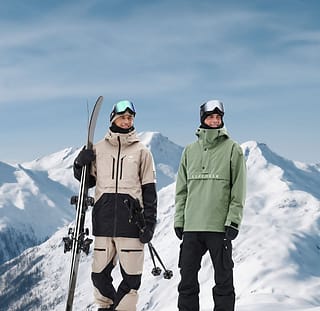Montec vs Dope Snow: How are the brands different?
Montec vs Dope Snow — two standout names in the snowwear game. Both come from the same parent company, but their styles, features, and riding focus set them apart. Let’s break it down.

If you’ve been skiing in the last few years, you’re sure to have seen both Montec and Dope Snow jackets and pants in the wild. With a distinct style, eye-catching colourways, and performance to take riders all over the mountain, they’re hard to miss. But you also might have heard that they’re the same brand. That’s not quite true, but they are owned by the same parent company. So let’s look at the two brands and how they differ!
Who is the target audience for each brand?
The target audience for Dope Snow is definitely more in the resort and park rider sphere. While Dope gear is more than capable of heading off piste and outside the resort, we made our snowwear to be super comfortable, stylish, and ready to tackle long days lapping groomers and hitting kicker lines.
When it comes to Montec, the bigger 20k waterproofing figure makes it ideal to rip both inside and outside the resort. If you like heading into the deeper snow and venturing off the beaten track, then Montec is ready for that adventure whenever you are! But, it still looks amazing putting it down in the park or straightlining groomers, too.

What’s the style and fit like for the two brands?
Dope’s laid-back and colourful style is easily recognisable on the mountain, and the fits throughout the range are a little on the baggy side. Certain jackets and pants in the range feature a more retro-inspired, boxy cut, which is extra roomy in the jacket and a little shorter than some other brands. While in the pants, this retro style is characterised by a wider leg all the way down.
When it comes to Montec, their blocky, panelled style is usually accented by high-contrast black and coloured combos that stand out everywhere you ride. They have more of a serious look, adding to their backcountry readiness, and in terms of fit, they’re roomy, maximising mobility, without being overly baggy and heavy.
What’s the history of the brands?
Dope Snow was started in 2008 in Sweden. The idea was to create a brand that looked more relaxed and fun than many of the stagnant, traditional European brands, yet still packed with the kind of tech and performance you’d expect from them. The idea took hold and the Dope Snow craze spread like wildfire. Since then, the brand has poured itself into improving quality and performance, and the results speak for themselves, with millions of the happiest riders in the world rocking Dope Snow kit every day of the winter (and sometimes the summer, too!)
Montec was developed as a sister company in 2016 with a more serious, backcountry-focused style and uprated stats to handle the harsher climates and demands of the North American market. With colder weather, deeper powder, and steeper terrain, Montec needed to be able to take it all in its stride, and that idea is what shaped Montec into the brand it is today.

What are the technical features and performance like?
Both Montec and Dope Snow use their own in-house designed waterproof membranes. Montec packs 20k/20k of waterproofing and breathability known as SHIELD-TEC, and Dope Snow has 15k/15k of waterproofing and breathability known as DRY Tech. Both brands also come with a PFOAS-free DWR treatment and use Comfortemp® insulation, along with fully taped seams for total elemental protection in all weather.
When it comes to other features, both brands also use adjustable, helmet-compatible hoods, have wrist gaiters, dedicated media and lift pass pockets, plenty of storage, as well as waterproof zips where needed, powder skirts, and adjustable hems.
Product range comparison
Both Dope Snow and Montec offer a wide range of ski and snowboard gear, including jackets, pants, and bibs in both insulated and non-insulated versions. They also have mittens and gloves, goggles, beanies and face masks. If you’re looking for base layers and fleeces, both brands have them, while Dope also offers T-shirts, hoodies, and ski socks.
Explore Dope products
Explore Montec products
Brand sustainability
Something that both Montec and Dope Snow pride themselves on is their commitment to sustainability. Both brands are bluesign SYSTEM PARTNERS, which means that they adhere to the strictest environmental and waste policies throughout the entire product life cycle, from the raw materials used to the manufacturing processes.
bluesign® is a global leader in sustainable practices within the garment industry, and both brands are proud to carry its mark of approval across their gear. Additionally, all gear from Montec and Dope is PFOA-free, PTFE-free, and free from other harmful chemicals. They also use as much recycled and recyclable packaging as possible, minimizing plastic wherever they can.
FAQ
Which country are Montec and Dope from?
Montec and Dope Snow are both Swedish brands and have their HQ in Gothenburg.
Who owns Montec and Dope?
Montec and Dope Snow are owned by a shared parent company, Ridestore, and company management, as well as product design and development is all done under one roof at their main office.
Are Montec and Dope online only?
Montec and Dope Snow are both direct-to-consumer companies, meaning they handle all of their own stocking and shipping. Ridestore maintains its own warehouses and handles its own distribution, which means it doesn’t stock in local stores, but it does pass on savings often associated with retail markup directly to its customers.
Related reading:
























